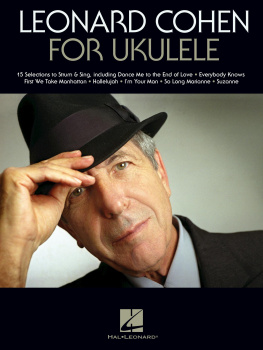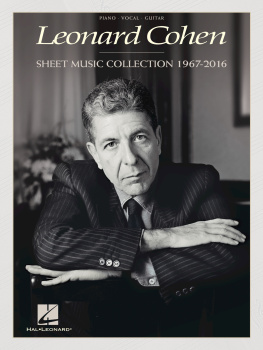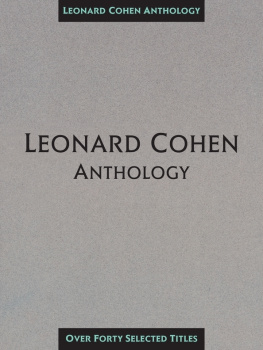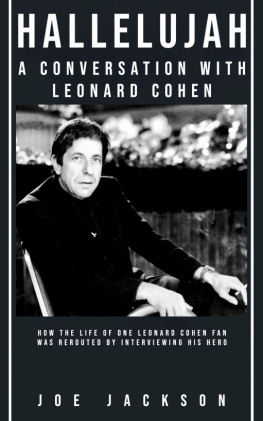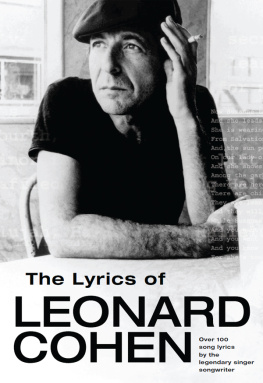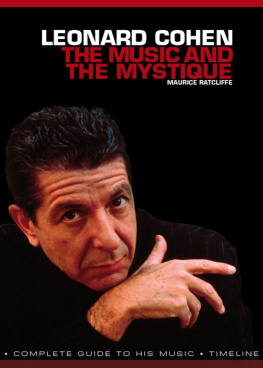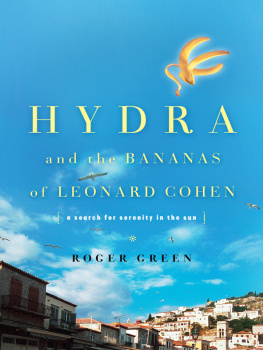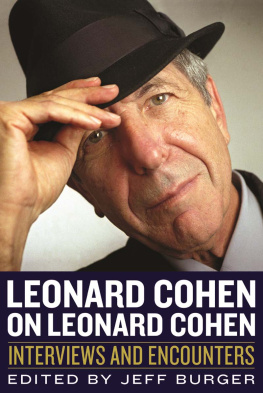Ira B. Nadel - Various Positions: A Life of Leonard Cohen
Here you can read online Ira B. Nadel - Various Positions: A Life of Leonard Cohen full text of the book (entire story) in english for free. Download pdf and epub, get meaning, cover and reviews about this ebook. year: 1997, publisher: Vintage Canada, genre: Non-fiction. Description of the work, (preface) as well as reviews are available. Best literature library LitArk.com created for fans of good reading and offers a wide selection of genres:
Romance novel
Science fiction
Adventure
Detective
Science
History
Home and family
Prose
Art
Politics
Computer
Non-fiction
Religion
Business
Children
Humor
Choose a favorite category and find really read worthwhile books. Enjoy immersion in the world of imagination, feel the emotions of the characters or learn something new for yourself, make an fascinating discovery.

- Book:Various Positions: A Life of Leonard Cohen
- Author:
- Publisher:Vintage Canada
- Genre:
- Year:1997
- Rating:3 / 5
- Favourites:Add to favourites
- Your mark:
- 60
- 1
- 2
- 3
- 4
- 5
Various Positions: A Life of Leonard Cohen: summary, description and annotation
We offer to read an annotation, description, summary or preface (depends on what the author of the book "Various Positions: A Life of Leonard Cohen" wrote himself). If you haven't found the necessary information about the book — write in the comments, we will try to find it.
Various Positions: A Life of Leonard Cohen — read online for free the complete book (whole text) full work
Below is the text of the book, divided by pages. System saving the place of the last page read, allows you to conveniently read the book "Various Positions: A Life of Leonard Cohen" online for free, without having to search again every time where you left off. Put a bookmark, and you can go to the page where you finished reading at any time.
Font size:
Interval:
Bookmark:
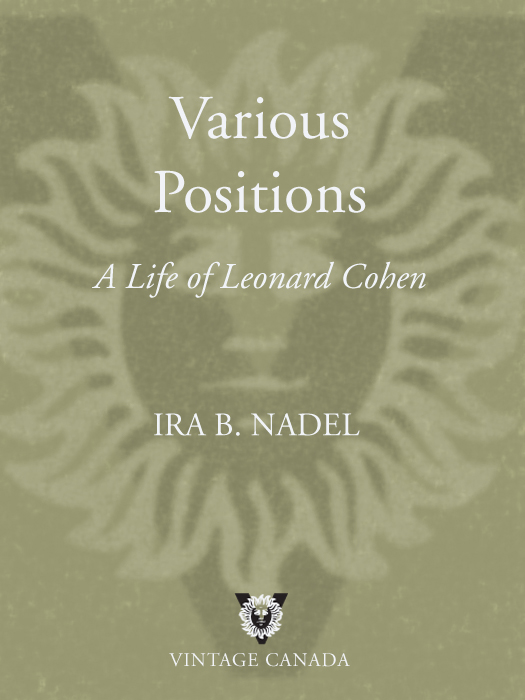
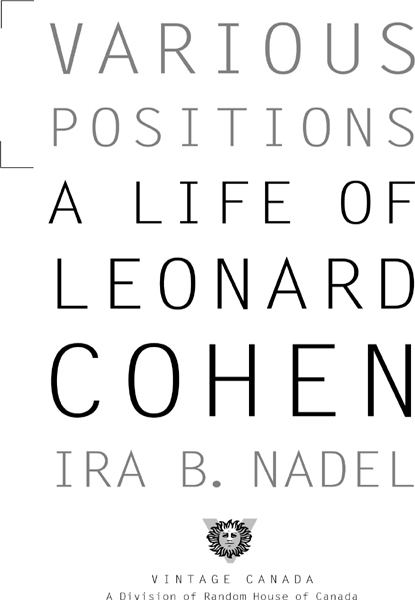
For Dara & Ryan
I wish I could say everything there was to say in one word. I hate all the things that can happen between the beginning of a sentence and the end.
Leonard Cohen, The Favorite Game
What is a poet? A poet is an unhappy being whose heart is torn by secret sufferings, but whose lips are so strangely formed that when the sighs and the cries escape them, they sound like beautiful music.
Kierkegaard, Either/Or
13.
T he enigma of Leonard Cohen: a well-tailored bohemian, an infamous lover who lives alone, a singer whose voice resides in the basement of song, a Jew who practices Zen. Attempting to unravel this mystery has taken me to Los Angeles, New York, Nashville, Montreal, and the island of Hydra, retracing his steps. Cohen has been patient throughout this process, even when I posed a question the publisher insisted I ask: could this be called an authorized biography? Cohen paused and then thoughtfully said, tolerated, adding an instant later, benignly tolerated. Such understatement disguises the remarkable assistance he and those close to him have provided for my work. In some small way, this account is an acknowledgment of their trust.
Cohen has been called part wolf and part angel; the grocer of despair; the poet laureate of pessimism; and, more colloquially, the prince of bummers. His early albums supported this view, morbidly described as music to slit your wrists by. After listening to Leonard Cohen, one woman exclaimed, Thank God Sylvia Plath never tried to sing! His later work shifted this view and his most recent albums have been called celebratory and, in a moment of rashness, optimistic. But his stylish, self-regarding abjection is present in virtually all that he writes, exhibiting a moody amorousness, a narcissistic eroticism that has only enhanced his appeal. Cohen has always felt gloomy but, as he has said, his gloom is probably no more intense than anyone elses. There is a confusion between depression and seriousness. I happen to like the mode of seriousness. Its peaceful and relaxing to me to be serious. Nietzsche sums up the paradox: In punishment there is so much that is festive.
Cohen had early success, a poet maudit whose gloomy anthems helped define a lingering literary adolescence. But his success has always been a qualified one; his records were critically lauded but sold unspectacularly, his books were controversial though largely unread. In the mid-eighties his work underwent a commercial resurgence as younger artists recognized their debt to him. A 1991 tribute album entitled Im Your Fan featured a series of alternative bands, and the 1995 tribute album Tower of Song followed.
The title of this book, Various Positions, originates in Cohens favorite album, released in 1984, but it is also a philosophical statement, reflecting a dictum offered by Cohens Zen master, Joshu Sasaki Roshi: A Zen man has no attachments. To fix a position, to hold a singular point of view for a lifetime, is antithetical to Zen because there are no absolutes in the Zen world. The only absolute is change; all is transition. The only thing that lasts and the only reality in Zen is the pure and unattached self, which one must constantly seek to uncover. To do so, however, requires discipline.
Whether writing three pages a day, as Cohens London landlady insisted he do in 1959, or laboring over song lyrics, which often take him years to complete, discipline is the source of Cohens success. Everything he writes must be worked over until it yields the truth. Last thought best thought, he has said, inverting the weight usually given to a first, spontaneous thought. I am formal, uptight, agonized most of the time, he told an interviewer in 1993. I have to do a lot of undressing before I can get to the truth; Im not a spontaneous, visceral kind of chap.
As part of the process of artistic discovery, Cohen preserves his work in all of its stages. His collection of notes, papers, journals, drafts, memoirs, and letters form a lasting record of his work. Such an archive, he explains, is at the very center of the thing. I see the work floating on the material. The published songs or poems are just the Beacon, the designationsomehow the signal for an investigation of the entire work. The archive is the mountain, and the published work the volcano.
He views his archive as the unhewn rock cited in the Bible: the thing you place on the altar, the ark, whatever the thing is thats hammered, thats ornamented, thats careful, but the platform has got to be unhewn rock, and its got to be there, and its got to be solid. His progress is noted in the increments of a miniaturist, each draft inching toward its goal. Through the work, Cohens life is seen, its small victories and continual setbacks. For better or worse, Cohen has retained every record of himself.
Keeping things was the only thing I had a sense of, Cohen has said:
I didnt have a sense of who I was, or where I was going, or what the world was like, what women were like. The only thing I had a sense of is that Im going to document this little life. I never said I was a great poet; never once did I suggest I was anything more than a minor poet and a songster and whatever it is. Let some other people make the designations. I only said that I got it here. Its all here. I did do what I set out to do which was to document my trip without any judgment on it. But my trip is here. There is no question about it.
Art holds a unity that history does not, and for Cohen, there is no separation between music and writing. This embodies the Judaic tradition of the unity of the Written Law with the Oral Law; they are inseparable, the Oral Law sometimes interpreted as the soul of the Written Law. Their revelations are contemporaneous.
In his life, Cohen has sought to witness, touch, and experience beauty at close quarters. The irony of this desire, however, is that once he touches it, it evaporates. The many he has loved, he has left. When he has obtained beauty, he has abandoned it, feeling that it entrapped him. As he writes in an unpublished novel, what I admire in the morning I despise by sundown. I change between glutton and renunciation. This has meant numerous broken love affairs; but it has also meant the endurance of his aesthetic. Out of the depression and despair comes the will to create.
But Cohen has always exhibited an undercurrent of self-mocking humor. I like to include a permission to laugh with most of my work, he remarked in 1992. Ive always thought I was a comic voice. But the humor doesnt undercut the essential seriousness of his work. Each book represents for me a different kind of crisis, he explained early in his career. He has dealt with such crises ritualistically, initially through poetry and later with novels, psalms, and narrative songs. His small but faithful audience recognizes him as an almost pastoral figure, providing a form of spiritual guidance. His music is eclectic: a mix of Mediterranean rhythms, folk ballads, country and western, blues, jazz, and gospel, a flexible, mournful idiom that constantly reshapes itself.
At the core of Leonard Cohens appeal is a poetics of survival, a means of confronting and transcending the darkness of the self. Aiding his own survival has been a twenty-five-year involvement with Zen Buddhism. Judaism initiated Cohens spiritual quest, but Buddhism has provided direction. Its process of liberation through suffering has led me to wherever I am. The importance of self-understanding in Zen has been its great attraction for him:
Font size:
Interval:
Bookmark:
Similar books «Various Positions: A Life of Leonard Cohen»
Look at similar books to Various Positions: A Life of Leonard Cohen. We have selected literature similar in name and meaning in the hope of providing readers with more options to find new, interesting, not yet read works.
Discussion, reviews of the book Various Positions: A Life of Leonard Cohen and just readers' own opinions. Leave your comments, write what you think about the work, its meaning or the main characters. Specify what exactly you liked and what you didn't like, and why you think so.

